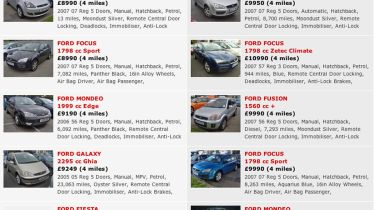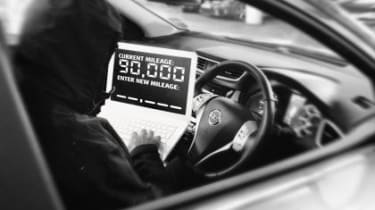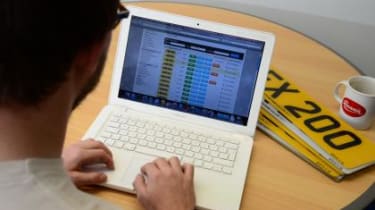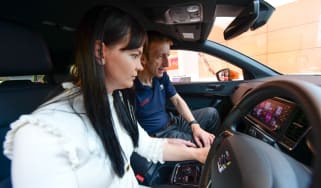Buying a used car: your complete guide
Buying a used car from a dealer or privately isn’t always easy. So here is our advice and tips on how to buy your dream second-hand motor

When buying a used car - whether that's privately, by going through a dealer or online - there is a certain amount of inherent risk. But if you do your research, learn what your rights are as a buyer, and know what to look for, you could save a substantial amount of money and prevent any nasty surprises further down the line.
Follow this guide - while making use of our used car checklist - and you can enjoy peace of mind and a great deal your new pride and joy.
When shopping for a used car, most buyers tend to aim for the ‘sweet spot’, when a car is three years old. This is because most new cars are bought on finance deals or company fleet leases which run for around 36 months, After this they are returned to the dealer or sold through auctions and usually find their way into the used car market.
At three years old, a car should be around half the price it was new, depending on the model and the mileage, but should still have plenty of life left in it. It’s a generalisation but data from warranty providers also suggests that car reliability tends to tail-off after 5 years so that’s a sensible point at which to move your used car on and look for a replacement.
There are still plenty of good cars which are 5+ years old, of course, just bear in mind that they may cost more to run and need more repairs than younger models.
Used car buying advice: the basics
When buying a used car, there are different hurdles to clear compared to when you’re buying new, but it is just as crucial to get these right. Here are some general tips to consider when choosing and checking that second-hand motor...
1. Get your finances in order first
Any car is a big investment, so the first thing you will need to do is accurately work out your budget and stick to it. If necessary, find out the best way to finance your car, whether it's a personal loan, vehicle finance or straightforward cash. Work out how much you can put down in deposit, and then calculate the monthly payments that you can afford. Do this, and you won't end up looking baffled when the salesperson asks, “how much have you got to spend each month?”. Our guide to car finance will help.
2. Keep on top of used car market prices
If you're in the market for a used car, then looking at various sites on the internet is a great way to see what is around and what you can afford. You'll get a good gauge on whether you're paying over the odds, and with so much choice, you don't have to rush into buying a car if you don't think it's quite the right one for you. If you're looking at mainstream models, then there will always be plenty of examples on offer if the price isn’t right. Our car valuation tool will give you a good idea of what is and isn't a fair price.
3. Check all paperwork thoroughly
There’s no point attaching any value to the pile of papers that comes with a used car if you’re not prepared to check them out. If you are buying from a private individual rather than a dealer, start by making sure the listed keeper is selling the car from the address stated on the V5C logbook, then check the logbook registration and chassis numbers against those on the vehicle.
After that you can start looking for any discrepancies in the service record, determine whether the cambelt needs renewal (this can be an expensive job on some cars), and check sales receipts that prove ownership and the end of any finance agreements. An HPI check will also help to expose any outstanding finance or hidden history.
4. Inspect the car carefully in daylight, and good weather
Rain on paintwork can hide a multitude of sins, as will streetlamps or torchlight, so try and look at cars in good weather, and definitely inspect them in daylight. Take your time to look over every panel, and all the trim surfaces inside. Older cars are bound to have the odd scuff, so of more importance will be to make sure all the switchgear and accessories work. Do the electric windows all open at the same speed, and does the air-conditioning blow cold?
5. Take a thorough test drive
It’s vital to ensure that the car drives and handles correctly, and performs as you would expect. Does the car start easily? Are there any unusual sounds from the engine or brakes? Does the steering pull to one side? Is there any telltale smoke coming from the exhaust? Remember to make sure you have insurance in place before setting off on a test drive. Check out our guide to test driving a car.
6. Is everything there?
Check under the boot floor to see if the spare wheel and/or repair kit are in place, the original jack and tools, plus locking alloy wheel nuts. Also check the glovebox for the vehicle handbook and ask the owner if any spare keys are present. Some cars will need sat nav discs or SD cards too. If any of these are missing, it could cause significant grief - and they’re all expensive to replace.
7. Finalising the deal
When you’ve agreed on a price and are going to buy a car, make sure all terms are agreed in writing, with a receipt that both parties can sign and keep a copy. It should show vehicle details, price, and terms of sale and both the seller’s and buyer’s name and address.
8. Paying for the car
If you’re buying through a reputable dealer there should be no concerns here, but it’s worth repeating the obvious advice about paying for a car in a private sale. Be careful about taking large sums of money to pay for a car. If possible, use a money transfer. Never take cash to a meeting place that isn’t the seller’s home address. Check out our guide to car finance here.
Used - available now

2023 Skoda
Octavia vRS Estate
56,250 milesAutomaticPetrol1.4L
Cash £18,799
2024 Volkswagen
Golf
46,000 milesManualPetrol1.5L
Cash £13,900
2026 Volkswagen
Polo
7,111 milesAutomaticPetrol1.0L
Cash £17,400
2021 Hyundai
Ioniq electric
32,496 milesAutomaticElectric
Cash £10,300Used car buying pitfalls: things to watch out for
We’ve covered the basic tips on how to buy a used car above, but unfortunately, not every seller is completely above board and not every car is as it seems. The guide below is designed to help you avoid the worst of the second hand car buying pitfalls and scams that can leave you out of pocket.

These are some of the worst-case scenarios that can trap unwary buyers in the second hand car market, but with care the risks can be avoided.
- Clocking - This is the criminal practice of misrepresenting a used car’s mileage by tampering with the odometer on the dashboard. It’s done simply to hide the true mileage of a vehicle in order to increase its value on the used car market. Our guide to car clocking and mileage correction will tell you more.
- Cloning - This involves fitting a car with copied number plates from an identical vehicle, usually either to hide the fact a car is stolen, or in order that criminals can rack up speeding fines and parking tickets in another owner’s name.
- Cut-and-shuts - These are cars that have been welded together from the remains of two (or more!) accident-damaged cars of the same type, and presented to buyers as one original – undamaged – car.
It has become harder to spot a clocked car in recent years, as improvements to quality and durability means modern motors hide high mileages very well. However it’s still worth looking out for some key clues:
- Check the MoT history online for discrepancies from one year to the next
- Significant wear to the driver’s controls – a shiny steering wheel, pedal rubbers, and indicator switch markings all suggest heavy usage.
- Worn out seat squabs and chafed seat belts are giveaways too.
Many of these signs can be easily masked by replacement trim parts, so it’s vital that you check the mileage history on service records and other documents. For more information read our investigation into car clocking.
How to avoid buying a cloned car

There’s an easy way to avoid buying a cloned car, and that’s simply by checking that all the numbers match up.
- Check that the number plate on the vehicle you’re looking at matches the number on the V5C logbook.
- Check that the VIN/chassis number listed on the V5C logbook matches the VIN plate on the car itself.
Nowadays you can usually find the VIN plate at the base of the windscreen, but on older cars the VIN plate can be inside the driver’s door jamb, or under the bonnet. To carry out the checks, you obviously need to be looking at a used car that has a V5C logbook. If the vendor can’t show you this vital document, that should throw up a warning about the car in the first place.
How to spot a cut-and-shut car
If professional criminals do a cut-and-shut, it’s possible to fool even the experts without an extremely thorough inspection. Unfortunately, however good a cut-and-shut car looks, the car’s compromised structural rigidity is likely to be highly dangerous, especially in a severe accident. HPI and similar vehicle history checks will reveal if a car has been recorded as a write-off, and you can make your own visual checks, too. Look out for:
- Uneven panel gaps and poor paint matching
- Paint overspray on glass or non-metal trim parts
Both of the above point to accident damage, but not necessarily a cut-and-shut. However you needn’t be too cynical, as experts reckon there are about 30,000 cut-and-shuts in circulation. This sounds a lot, until you remember that well over 7 million used cars are sold in the UK every year.
Did you know you can sell your car through Auto Express? We’ll help you get a great price and find a great deal on a new car, too.
Find a car with the experts










